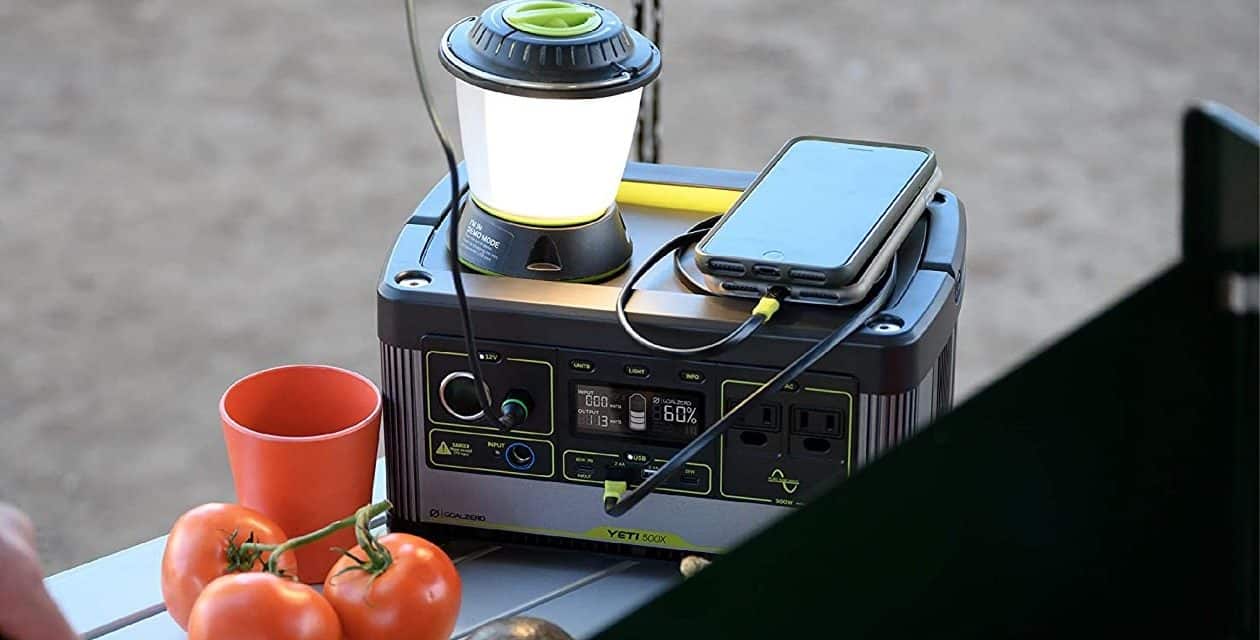Camping without hookups but concerned about staying connected? Luckily, a quality camping generator can help you power all of your essential devices while outside.
There are hundreds of portable generators out there, though, so selecting precisely the right model for your camping trip is no easy feat. That’s why we’ve put together this buying guide to the best camping generators on the market today.
In this article, we’ll introduce you to the fundamentals of portable generators and discuss what you need to know to find the best one for your needs. We’ve even reviewed 5 of the top models available for you to choose from.
What is a portable camping generator and what can you use it for?
A portable camping generator is essentially a mobile energy source. You can use a portable generator to power various devices, like smartphones and cameras while you’re tent camping.
Alternatively, if you’re at a campground that doesn’t offer hookups, you can use a portable generator to power your RV or camper van.
Depending on the size of your generator, you can use it to power a whole host of appliances and devices, including:
- Smartphones
- Laptops
- Headlamps
- Cameras
- TVs
- Mini fridges
- Portable AC units
- Electric space heaters
So long as your generator provides enough wattage and has the appropriate outlets, you can charge and power nearly any small to medium-sized device or appliance.
What size generator do you need for camping?
It’s difficult to provide a definitive answer regarding the size of generator that one needs for camping because your generator needs greatly depend on what you plan to use it for. As you can imagine, someone looking to occasionally charge a smartphone will have vastly different generator needs from someone looking to power a mini fridge.
Here are some general guidelines that you can follow for determining how much power typical devices and appliances need:
- Smartphone: 6 watts
- Laptop: 30 watts
- LCD TV: 50-100 watts
- Portable AC Unit: 600 running watts (1700+ starting watts)
- Mini Fridge: 700 running watts (2200 starting watts)
Of course, these requirements can vary from appliance to appliance. So, check your specific device’s energy requirements first before buying a generator.
As you can see, larger appliances require more power output. So, if you’re looking to only power small to medium devices, you can get away with a 100-500 watt generator. Alternatively, for powering fridges and AC units, you’ll want at least 1000 watts of power.
How long do generators last?
The lifetime of a generator varies greatly from model to model.
Depending on the quality of the engine, you can expect between 1000 and 2000 hours of total runtime from a portable generator. This might not sound like much, but if you use it for only 100 to 200 hours a year, you can get up to 10 to 20 years out of your generator.
Alternatively, the lifetime of a solar powered generator depends on its battery’s total charging cycles. For example, the Goal Zero Yeti 500X has a maximum of about 500 battery life cycles. Again, this doesn’t sound like much, but, unless you plan to constantly run a mini fridge, you can expect years of use out of a single battery on most portable solar generators.
As far as runtime goes, this, too varies from model to model.
Most gasoline or propane powered generators can last about 3-10 hours on a single tank of fuel. However, a single tank could be as small as 1 gallon or as large as 3 gallons, so it’s important to compare apples to apples when judging a generator’s runtime.
For solar powered generators, you can expect upwards of 30 hours of constant run time on a mini fridge from larger models. Or, if you’re using the generator to charge devices, you can often get dozens of smartphone charges without depleting its battery. But, again, this all depends on the specifics of the model in question.
Top 5 Best Portable Camping Generators
#1 – Honda EU 2200i
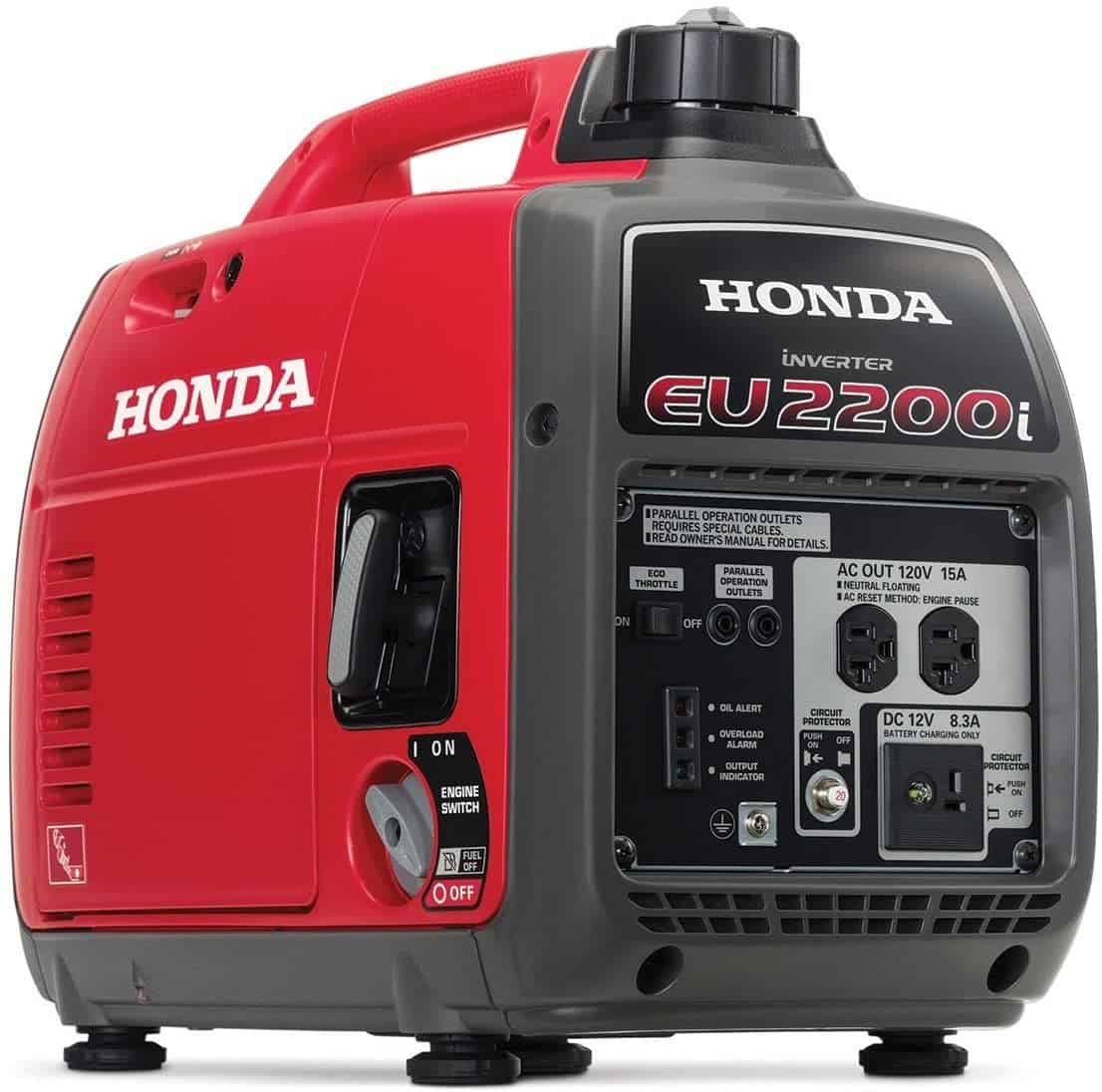
Powerful and portable, the Honda EU 2200i is a best-selling generator that’s ideal for powering larger appliances while camping.
Although it’s a bit heavy at 47lbs, this generator produces up to 2,200 watts, which is enough to run mini fridges, laptop chargers, and other medium to large devices. You can also link together 2 of these generators to create an impressive 4,400 watts of energy at once.
It runs off of a commercial-grade engine that produces only 48 to 57 dBA of noise. This makes it one of the quietest portable gas-powered generators on the market. Moreover, it is very efficient with its fuel consumption, as it can run for up to 8.1 hours on a single gallon of gas.
When it comes to plugging in your devices, you also have a few different outlet options to choose from. This generator comes with two AC outlets and even a 12V DC outlet for charging up automotive-type batteries.
pros
- Can be linked with another generator for up to 4,400 watts of energy
- Includes two AC and one 12V DC outlet
- Highly fuel efficient for a gas generator
- Makes minimal noise (just 48 to 57 dBA)
cons
- Heavy
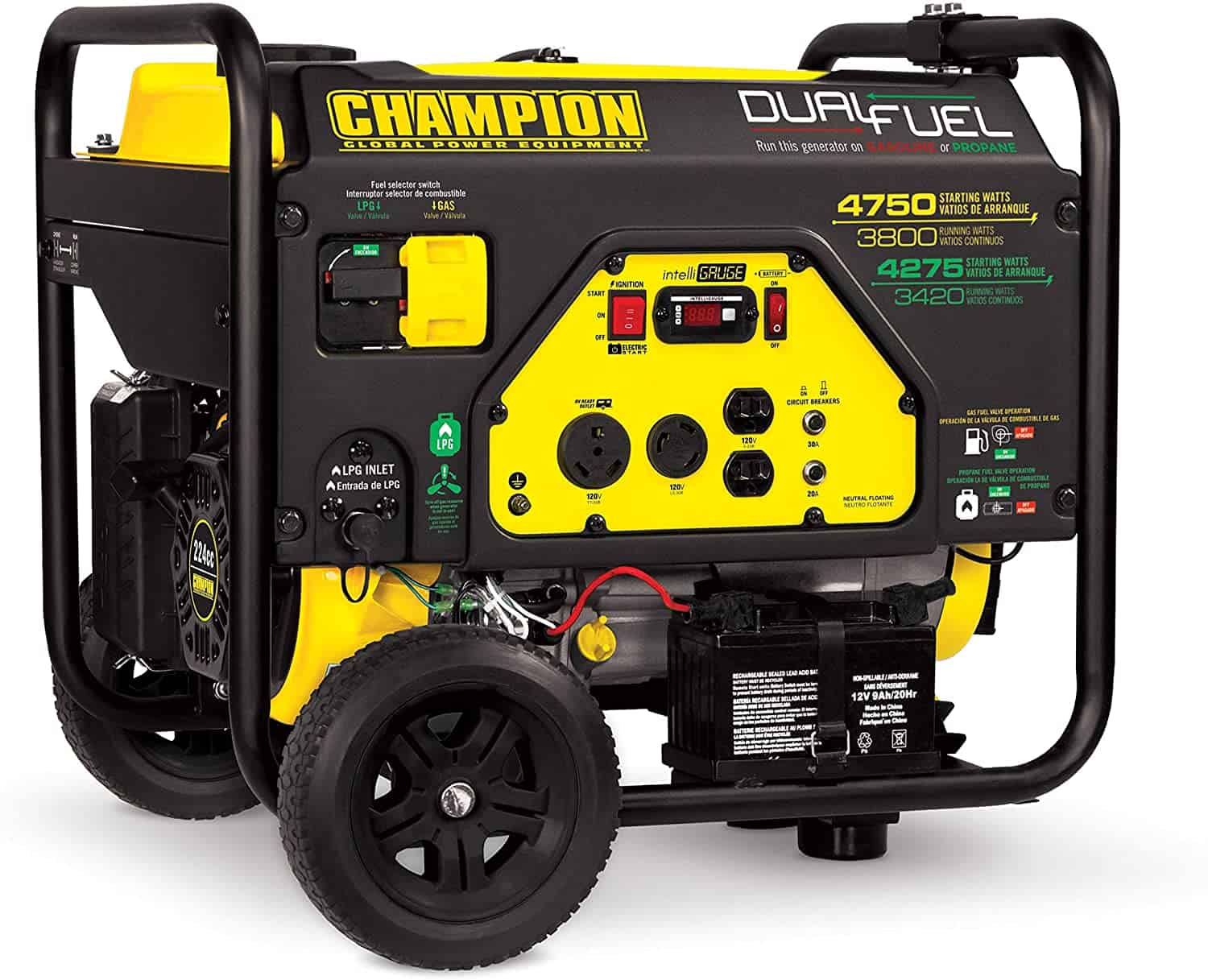
For maximum versatility at the campground, the Champion Power 76533 Dual Fuel is hard to beat.
This high-end generator is designed to run on either gasoline or propane, allowing you the flexibility you need when you’re outside. It boasts an electric-start 224cc engine and an included battery, so it’s ready to go camping, right out of the package.
Champion built this generator with an Intelligauge system, which provides constant monitoring of its voltage, run-time hours, and power output for better performance. With 3,800 watts of power, this generator is even strong enough to run an air conditioning unit or a mini fridge.
Plus, the Champion Power 76533 comes with two AC outlets, one 120V locking outlet, and one 120V RV-style outlet for added convenience.
This generator is even designed to power right up in cold temperatures, thanks to its Cold Start Technology. That way, you can enjoy your camping trip, regardless of the weather conditions.
pros
- Powerful 3,800 watt output
- Can use either gasoline or propane
- Cold start technology for use on frigid mornings
- Intelligauge power monitoring system
cons
- Not very fuel efficient (9 hour run time on 3.4 gallons of gasoline)
#3 – Goal Zero Yeti 500X
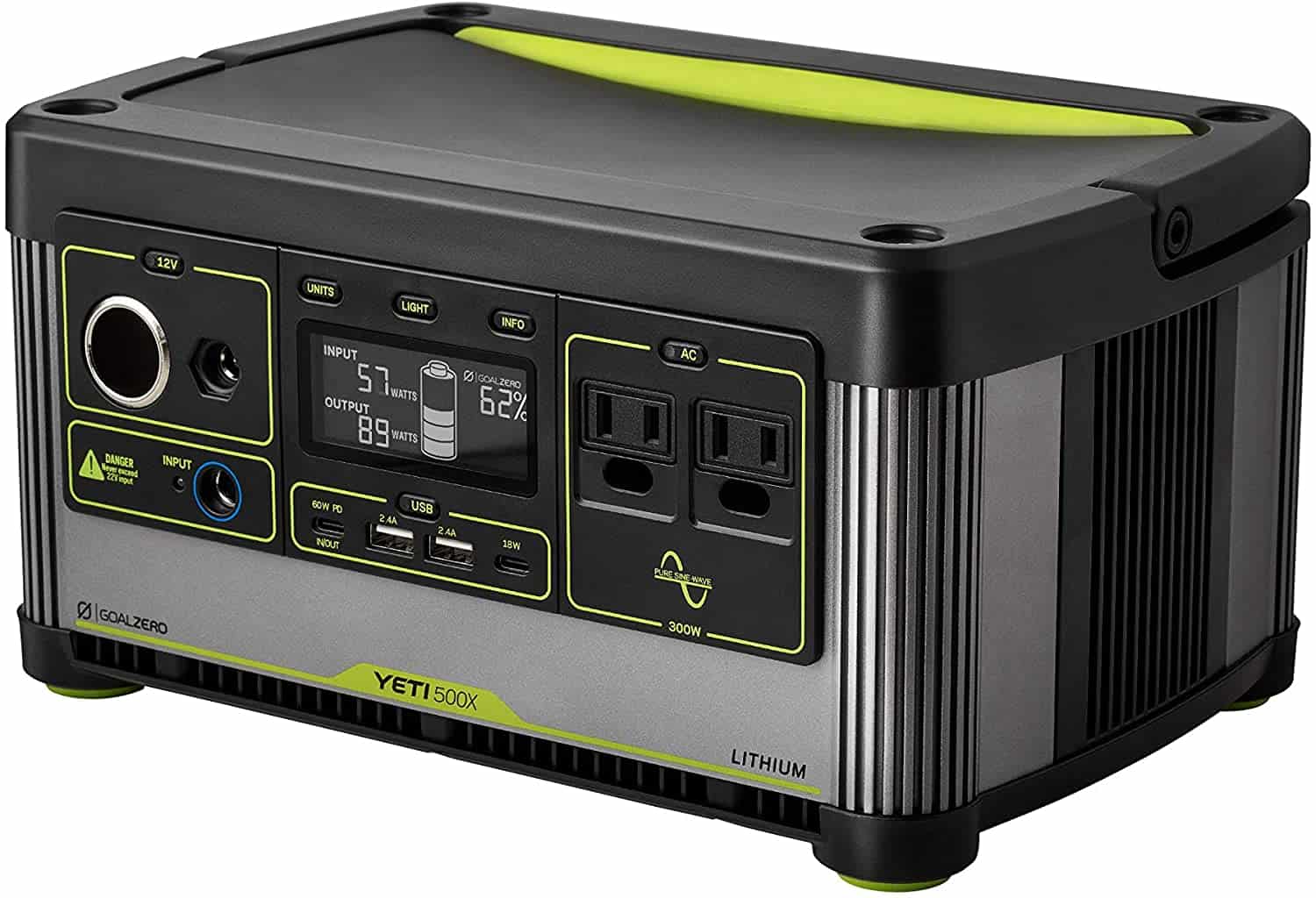
Taking solar power to the next level, the Goal Zero Yeti 500X is an environmentally-friendly option for staying plugged in at camp.
With this portable power station, you can charge and power everything from a laptop to a mini fridge. It features AC, 12V, USB, and USB-C outlets for maximum versatility with your devices.
To charge up the Yeti 500X, you have a number of different options. You can plug it into a wall outlet at home before you leave for camp, or you can power it using your choice of solar panel.
Once the generator is powered up, it can recharge a headlamp up to 100 times or a smartphone up to 40 times. Alternatively, if you want to directly power a larger appliance, you can expect up to 20 hours of run time with a fridge or 5 hours of run time with a 40” LED TV when using this solar generator.
pros
- Very long battery run time
- Great assortment of outlets and charging ports
- Can be charged through either wall outlets or solar panels
- Environmentally-friendly
cons
- Heavy and bulky for a solar generator
#4 – Jackery Explorer 500
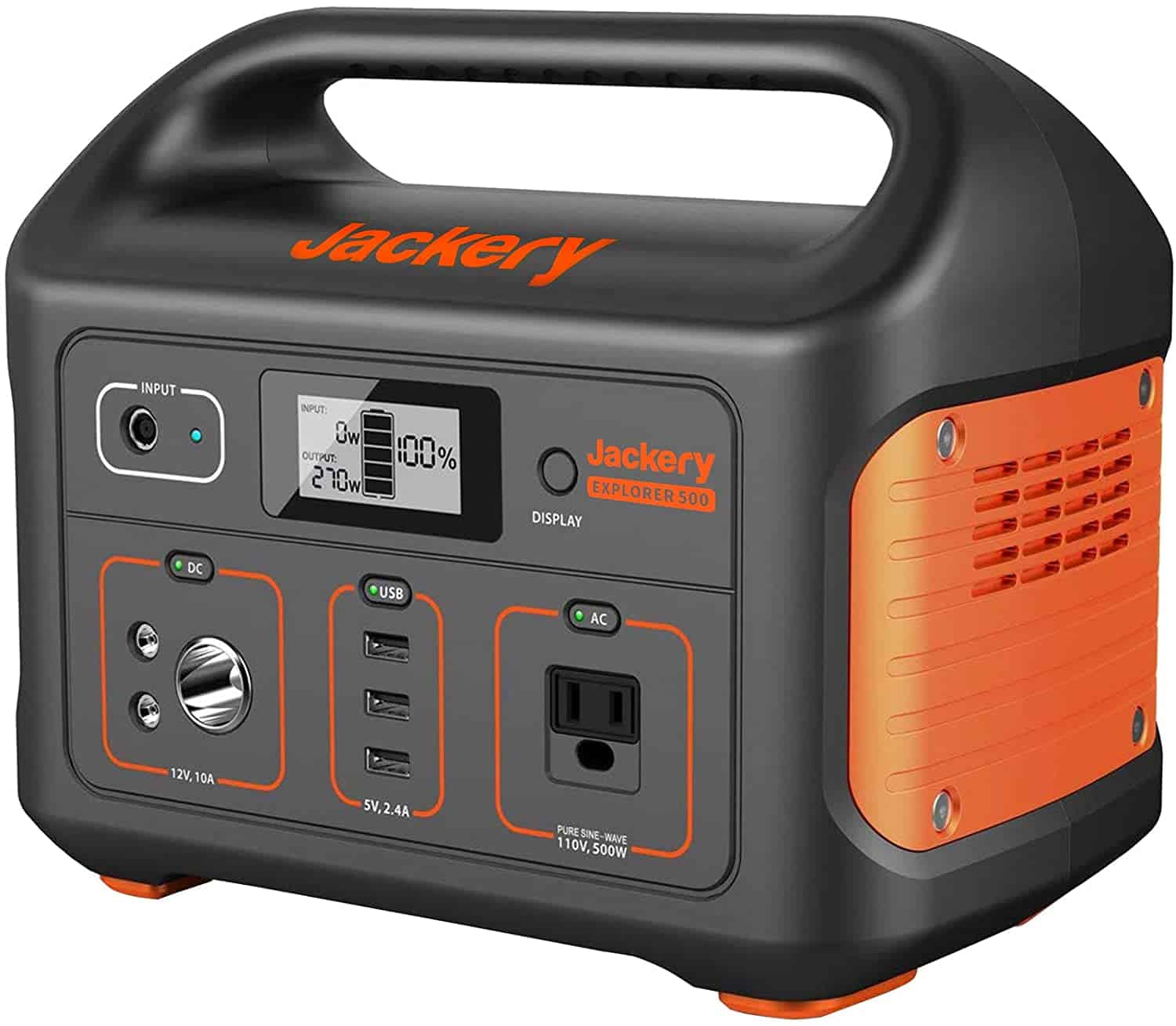
An all-in-one solution for campers that want to harness the power of the sun to run their devices, the Jackery Explorer 500 is a powerful generator for regular use.
With 518 watts of power output, this generator can run small to mid-sized appliances, such as laptops and TVs. It can be charged by solar panels as you’re out and about or through AC outlets and DC carports.
For ease of use, Jackery included an LCD screen that provides real-time data on the battery life of this generator. It boasts three USB ports, one AC outlet, and one 12V car outlet for added versatility with your devices.
On average, it takes 7 to 14 hours to charge this generator, depending on your power source. Then, it can run a mini fridge for up to 37 hours or charge a smartphone over 34 times.
Plus, the Explorer 500 is relatively small for a solar powered generator of this magnitude. It weighs about 13 lbs and has an oversized handle for easier transport.
pros
- Lots of outlet options
- Relatively affordable for a 500W generator
- LCD screen provides real-time battery life information
cons
- Takes a while to achieve full charge
#5 – Goal Zero Yeti 150

When portability is your chief concern, the Goal Zero Yeti 150 is a solid choice. Packing a lot of power into a small frame, this generator is just 8”x7”x6” in size, so it’s easy enough to pack on any car camping trip.
It can be plugged directly into a solar panel for daytime charging when you’re at your campsite. With a solar panel, the Yeti 150 completely charges in about 11 to 22 hours, depending on the size of the panel you use. Alternatively, you can charge it off of your car’s 12V port or from a wall outlet in about 6-8 hours.
Despite its small size, this generator can power anything smaller than a laptop, including a phone, headlamp, or e-reader. This generator offers one AC outlet, two USB charging ports, and a 12V outlet so you can power all your small to medium devices.
It can even sit unused with a fully charged battery for up to 3 months without losing power. Finally, it has a convenient pop-up carry handle for easier transport to and from your campsite.
pros
- Small size for easier transport
- Large carry handle built-in
- Can power devices as large as a laptop
- Rechargeable via solar panels, wall outlets, and 12V ports
cons
- Takes a long time to recharge
- Not for large appliances
What to look for in camping generators
Camping generators are quite complex pieces of gear, so it’s essential that you know what to look for as you shop. Here are some key things to keep in mind before you buy.
Solar vs. Gas/Propane
Perhaps the biggest decision you’ll have to make as you shop for a camping generator is whether you want a solar or a traditional gas/propane powered model. This is how each type performs in the real world:
Gas and propane generators
Gas and propane generators are by and large the more traditional choice for camping purposes. These generators essentially have small motors built-in that convert energy from fossil fuels into electricity to allow you to charge or run appliances.
The main benefit of a gas or propane generator is that you can use it at any time of day or night. So long as you have fuel available, you can power your devices or run your appliances.
In general, gas generators are cheaper to run than propane models. However, in the long-term, they are both more expensive than solar generators, which don’t require any fossil fuel.
Moreover, gas and propane generators tend to be quite noisy, which can be problematic for nighttime use. You also have to take care when using these generators as they can produce dangerously high levels of carbon monoxide in enclosed spaces.
Solar generators
Compared to gas and propane generators, solar models are new to the camping world. However, they’ve taken the car camping community by storm because they are so simple and easy to use.
With a solar generator, you can harness the power of the sun to charge all of your devices. Some higher-end models are also powerful enough to run mini fridges and even TVs for upwards of 30 hours at a time.
The key advantage of solar generators is that they are eco-friendly. Although there are certainly a lot of emissions that go into producing a generator, once you have it, you can charge it completely off of the sun’s energy.
Of course, solar energy can be fickle, so it’s difficult to charge a solar generator during a cloudy day or at night. Thankfully, you can often charge your generator at home before you leave for camp to ensure that you’ll always have power.
With that in mind, one of the most important limitations of a portable camping solar generator is in terms of wattage. While you can find models that produce up to 1000 running watts, most portable solar generators can’t produce the starting watts necessary to turn on an AC unit or similar appliances.
Power Outage (Wattage)
Once you decide what kind of generator you want, it’s time to determine how much power you need.
With generators, power output is expressed in terms of watts. More watts equals more power, so higher watt generators can power larger appliances.
However, big appliances have both running watts and starting watts, so you’ll have to keep these in mind as you shop.
Running watts refer to the amount of energy than an appliance needs when in use. Starting watts, on the other hand, are the extra watts that an appliance needs for a few seconds when it turns on.
The starting watts of an appliance can be 2 to 3 times larger than the running watts. So, when buying a generator, be sure that it can handle this surge in energy demand.
Fuel Efficiency
Another key consideration with camping generators is fuel efficiency. All generators require some sort of fuel source that they can then convert into electricity for you to use.
With gas and propane generators, fuel efficiency is fairly straightforward. You simply need to divide the number of gallons in the fuel tank by the number of hours of run time to determine the gallons used per hour. Of course, more efficient generators are ideal because they save you money on fuel expenses and are better for the environment.
For solar generators, fuel efficiency is a bit more convoluted. You’ll have to weigh the maximum runtime of the generator with how long it takes to charge. However, charging times vary greatly with solar generators due to differences in solar panels and environmental conditions.
Therefore, the most important metric to consider when looking at a solar generator is run time/number of device charges when deciding its overall efficiency on a single battery cycle.
Frequently Asked Questions
CAN YOU RUN A GENERATOR OVERNIGHT?
You can run a generator overnight, but it’s generally not ideal to do so. That’s because most generators will only run for about 3 to 10 hours, so you’ll probably completely empty your fuel tank before daybreak.
Moreover, most generators are quite noisy, so your campground neighbors won’t be happy with you if you keep yours running until the wee hours of the morning. In fact, most campgrounds have rules about generator use that prevent overnight operation.
HOW DO YOU PROTECT A PORTABLE GENERATOR FROM RAIN?
To protect a portable generator from the rain, you can place it under an awning or some other overhead covering. It’s also worth propping up your gas or propane powered generator on a piece of plywood to protect it from the wet ground.
If you don’t have an awning, consider pitching a tarp over the generator to protect it from the rain. Be sure that there’s enough airflow around the generator to prevent a dangerous build-up of carbon monoxide.
WHAT IS THE LIFESPAN OF A PORTABLE GENERATOR?
Most gas or propane-powered portable generators have a lifespan of 1000 to 2000 hours of runtime. This often equates to about 10 to 20 years of use under normal conditions.
Alternatively, solar generators have maximum battery life cycles of about 200 to 1000 charges. Depending on how often you use your generator, it could last for 3 to 15 years.
WHERE IS THE BEST PLACE TO PUT A GENERATOR?
There’s no “ideal” place to run a generator as you should place it wherever it’s needed most. But there are places where you shouldn’t run a generator.
For gas or propane generators, you should never run them indoors or inside an enclosed space. This includes tents, which are a no-no because of the toxic fumes that come from generators.
With solar powered generators, however, there’s no risk of carbon monoxide. So, once your solar generator is fully charged, you can take it in your tent with you to charge your phone overnight.
Final Thoughts
Portable camping generators are a great way to keep all of your essential devices charged and operable while on an adventure. Even if you’re far from an outlet or a hookup, having the right generator on hand can ensure a comfortable camping experience throughout your trip.
- The 5 Best Heated Vests of 2022 - November 17, 2022
- 5 Best Campfire Cooking Tripods in 2021 - October 20, 2020
- 5 Best Camping Generators (Buying Guide) In 2022 - October 9, 2020

